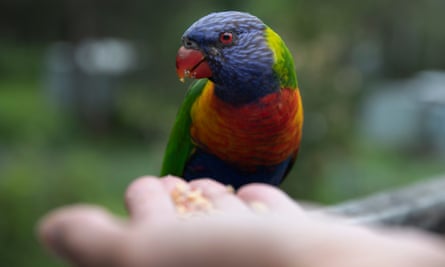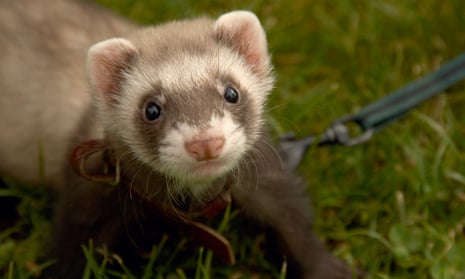While it is well established that demand for cats and dogs has risen during lockdown, figures show that many people have turned to more unusual pets for companionship during the pandemic.
With socialising all but banned in repeated lockdowns, nearly 20,000 parrots were rehomed last year by Pets4Homes, up 79% on 2019 – perhaps in the hope of extra conversation to fill the void. Chickens, stick insects and salamanders are also among the more unusual pets to have risen in popularity.
Owners of quails, ferrets and tarantulas have felt comforted by taking care of their pets and have had the time to dedicate to their new furry or feathered friends.
Lily Wakefield and her flatmates became obsessed by the idea of owning pet quails last spring after watching TikTok videos of people hatching quails’ eggs and trawling the depths of “quail Instagram”. They tried unsuccessfully to hatch eggs using an incubator they ordered online, before adopting their flock.
Since July, their low maintenance trio – Quailor Swift, Nelson Manquaila and Christopher Quailumbus – have lived happily in a hutch in their garden in Clapham, south London, and also roaming freely around the flat while everyone works from home.
“They’re very funny and have individual personalities,” Wakefield said. “We’re so happy with them. They’re also a great conversation starter as nobody is doing anything in lockdown, and we get so many eggs to give to our neighbours.” Less impressed was their resident Sphynx cat, Sappho, who, six months on, remains “shit-scared of the quails”.
The rise in rehomings has prompted concerns that some have taken on animals without realising how much work they can be. Daniella Dos Santos, the senior vice-president of the British Veterinary Association, warned that people may find themselves unable to look after their new pets after returning to their busy schedules.
For Jenna McBriarty and her partner, lockdown provided the perfect opportunity to start the ferret family they had always wanted, adopting inquisitive brothers Pip and Ghost, and later rescuing a third, Luna. The long periods at home were critical when it came to raising them, particularly for sensitive Luna.
“We had to spend a lot of time with her individually to build her trust. It took a lot of bitten fingers but she’s a complete success story,” said McBriarty, from Newcastle, stressing the care and attention ferrets need. “If it hadn’t been for the pandemic I don’t know if we would have seriously considered getting them.”
They have proved amazing therapy animals for McBriarty, who struggles with anxiety. “They’re so clever and connected to their owners, they pick up on how you’re feeling and manage to make you smile, even on a really down day.”
Romy Miller, a furloughed barista, also found comfort in watching her beloved axolotl, Pluto – a “little water dragon” – grow into a healthy adult. Axolotls are high maintenance, she stresses, and not for everyone, requiring a lot of work and care.
“They’re the most incredible amphibians,” said Miller, from Northampton. “That’s kind of a bright side of lockdown, I guess – more time to appreciate what you love more often, friends, family, pets.”
It was a busy year for Annalise Silver, a comms manager, with adjusting to a new job and working remotely, but she was kept thoroughly entertained by the antics of her furry home-office mascot Mr Fuzzy Wuzzy, her baby Brazilian whiteknee tarantula.
Though she reluctantly acquired him from a friend who had a change in circumstances, she is now very taken with Fuzz. “He keeps me entertained spinning webs and swimming in his palatial rock pool while I join calls with stakeholders from all across the business.”

The same can’t be said for Silver’s brother, though, who sometimes has lucid dreams that a human-sized Fuzz is sitting on his ceiling.
Bitu Thomas, from Dagenham, east London, was also keen for her nine-year-old son, Ayden, lonely after months at home and not seeing his school friends, to have his first pet. She adopted a pair of mischievous Australian scaly-breasted lorikeets just before the November lockdown. Phoenix and Harmony quickly became part of the family, singing a different song depending on who was coming down the stairs.
“Ayden’s had a lot of screen-time with remote learning and being an only child … the birds break him away from all of that,” she said. Though they’re very messy and require a lot of time and attention, the family has enjoyed sharing the responsibilities. “I clean them, my husband makes them toys, my mother feeds them and Ayden entertains them. It’s brought us closer as a family.”










